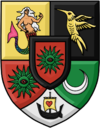Courts of Sabia and Verona
Courts of Sabia and Verona | |
|---|---|
 Logo of the Courts (2013–15) | |
| Type | |
| Type | |
| Houses | Senate Chamber of Deputies |
Term limits | 6 months (2012–14) 1 year (2014–15) |
| History | |
| Founded | 20 October 2012 |
| Disbanded | 15 July 2015 |
| Succeeded by | Parliament |
| Elections | |
Senate voting system | Ennoblement by the monarch |
Chamber of Deputies voting system | Plurality (2012–14) FPTP (2014–15) |
| Meeting place | |
| Palace of La Casona (Senate) Legislative Palace (Chamber of Deputies) | |
The Courts of Sabia and Verona (Middle Sabian: boxun), generally referred to as the Legislative Courts, was Sabia and Verona's bicameral legislature from the Kingdom's foundation in 2012 to 2015. Initially founded as a unicameral parliament, the Constitution of 2014 made the Courts bicameral, comprised of the upper Senate and the lower Chamber of Deputies. The Senate was modelled after the British House of Lords, and it was comprised by Sabioveronese nobles appointed by the Monarch; the Chamber of Deputies was made up of plush toys directly elected through universal suffrage in single-member constituencies. The speakers of the houses were the Governor and the Prime Minister, respectively.
In July 2015, Prime Minister Bertrand Rivière dissolved the Courts in an unconstitutional move and seized power temporarily in order to conduct the Congress of Salisse, in which the Constitution of 2015 was written. The 2015 constitution replaced the bicameral Courts with the unicameral Parliament of Sabia and Verona, which remains to this day the Kingdom's legislature.
History
The Courts of Sabia and Verona first met on October 18, 2012, when the original 20 members agreed to establish the principles and main bases for the Sabioveronese nation, as an entity and as a society. The Courts were named after the Cortes Generales of Spain. Since October 18, the Courts have met several times, remarking October 20, October 25 and November 1. In the early months of Sabia and Verona, the then Sahoedang socialist movement leaded by Napoléon Bleuberrie had obtained a constant and clean majority in the Courts, which managed the party to have a much greater impact than the conservative Unity Party that had been founded not so long after the Sahoedang took power of the Sabioveronese premiership. The social and cultural impact of the Courts were an important part of the strategy that Bleuberrie had designed to lead Sabia and Verona into a socialist government, but the effects of the socialist politicians in the legislature were not enough to obtain full support from the Sabioveronese people.
With the December 2012 general elections, a new legislature is elected, this time with Unity majority, and with Osez Kóvérsz as Speaker. This new elected legislature would comprise 11 Unity members and 9 Socialist members, and they first met on January 3, 2013. During the last of the Kóvérsz term, the Courts lost activity. With the May 2013 elections, the Socialist Party earned ten seats while the Unity Party won only five seats. It would be the first time third parties joined the Legislative Courts, with the Strawberry Party earning three seats and the Free Suyu Front earning two seats. Bleuberrie comes back as Speaker of the Courts. The XAM and the FSF would later become one party, the Roots Party and thus having the same amount of seats as the Unity Party.
With the creation of the Federal Union of Juclandian Lands, the Courts voted for the coronation of a new monarch different from King Ciprian. The Courts voted in favour of Isadora Annenak, former Governor, to become Sabia and Verona's new monarch. On 23 February 2014 a new Constitution came into effect and the Courts became a bicameral parliament, separated into the Senate of Sabia and Verona and the Chamber of Deputies. The Senate would represent the Federal Citizenry (humans) and the Chamber of Deputies would represent the Provincial Citizenry (plush toys). The Senate would be headed by the incumbent Governor, while the Chamber of Deputies would be headed by the First Secretary. The pre-constitutional reform unicameral Courts of Sabia and Verona became the Chamber of Deputies, with the same 20 members and factions.
Following the election of Bertrand Rivière as First Secretary at the September 2014 election, the conservative leader, counting with support from the newly elected lawmakers passed a series of laws that would be known as the October reforms or the Aishayerovê, the Great General Assembly. These reforms changed the names of many of the Kingdom's institutions, including the Senate, which would be known as the Gentáriven, and the Chamber of Deputies, which would be known as the Ayerovê. The reforms also included the introduction of a nobility and peerage system in Sabia and Verona, and the Gentáriven was further divided into the Council of Elders and the Council of Nobles, the latter of which was composed of non-Sabioveronese individuals counting with Sabioveronese peerage or nobility titles. In addition, these chambers would be active for a one-year period, instead of the six-month period that had been in use until then.
By mid-2015 however the legislative power of Sabia and Verona was completely inactive, and the system that had been adopted at the Aishayerovê had proven to be a failure in praxis. By June 2015 the Ayerovê had met three times, Council of Elders had met once and the Council of Nobles had not met once. Since the judicial power in Sabia and Verona was directly dependent to the Legislative Courts, two of Sabia and Verona's three political powers had been frozen for months. In 12 July 2015 Rivière met with the Lt. Secretaries of the Sabioveronese prefectures and after obtaining approval from the Queen, effectively dissolved the Sabioveronese legislature. Although the move was not precisely constitutional, Rivière defended the decision by saying the 2014 constitution had not foreseen a scenario in which the legislature could render itself deedless.
Authority
The Courts were considered the union between the Federal Citizenry and the Provincial Citizenry in Sabia and Verona. As stated in the 2014 Constitution, the Courts were to assume the role of both the legislative power and the judicial power of Sabia and Verona. Being a parliamentary constitutional monarchy, the Courts played an important role in Sabioveronese politics, being the main governing body. As legislative power of the Kingdom, the Courts took care of law making, which usually fell into the hands of the Ayerovê. Important laws, constitutional reforms, Crown-related issues and otherwise stated issues must pass through the Gentáriven as well.
The Courts of Sabia and Verona took care of judicial affairs before the Constitutional reform of 2014, but it was shared with the Commission for the Preservation of Democracy, which usually held more power than the Courts on judicial matters. Since the creation of the Federation, the judicial power of Sabia and Verona is vested in the Courts, specifically in all members of the Senate and a five-member commission from the Chamber of Deputies which conform the "Judicial Power of the Courts".
List of members (2012–15)
1st Courts (2012–13)
| 1st Courts of Sabia and Verona | ||

| ||
| Party | Seats | |
|---|---|---|
| Socialist Party | 12 | |
| Unity Party | 8 | |
| District | MC | Party | Notes | ||
|---|---|---|---|---|---|
| Sabia | Aguasblancas | Paula Lapette | Socialist Party | ||
| Eliana Muumsen | Socialist Party | Cabinet minister. | |||
| Mafalda Salvador | Unity Party | ||||
| Guido Vogelauge | Unity Party | ||||
| Caenia | Richard Agobe | Unity Party | |||
| Ernesto DaVilha | Unity Party | ||||
| Árigos Grenouille | Unity Party | ||||
| Timothy Lawrence | Socialist Party | ||||
| Saint Enric | Napoléon Bleuberrie | Socialist Party | Prime Minister | ||
| Étienne Boulin | Socialist Party | Cabinet minister. | |||
| Léon Galieri | Socialist Party | Cabinet minister. | |||
| Pomme-Gabrielle Gauvier | Socialist Party | ||||
| Snø Jens | Socialist Party | Cabinet minister. | |||
| Vinter Jens | Socialist Party | Cabinet minister. | |||
| Ulla Müller | Socialist Party | ||||
| Verona | Hidram Cerwyn | Unity Party | |||
| Petyr Cohen | Socialist Party | ||||
| Suipom Goyo | Unity Party | ||||
| Dovedán Pashor | Socialist Party | ||||
| Gonzalo Salomé | Unity Party | ||||
2nd Courts (2013)
| 2nd Courts of Sabia and Verona | ||

| ||
| Party | Seats | |
|---|---|---|
| Unity Party | 11 | |
| Socialist Party | 9 | |
| District | MC | Party | Notes | ||
|---|---|---|---|---|---|
| Sabia | Aguasblancas | Paula Lapette | Socialist Party | Re-elected. | |
| Amaro Perdeut | Unity Party | Cabinet minister. | |||
| José Valladolid | Unity Party | ||||
| Guido Vogelauge | Unity Party | Re-elected. | |||
| Caenia | Árigos Grenouille | Unity Party | Re-elected. | ||
| Nadia Kóvérsz | Unity Party | ||||
| Osez Kóvérsz | Unity Party | Prime Minister. | |||
| Timothy Lawrence | Socialist Party | Re-elected. | |||
| Carla Mora | Unity Party | Cabinet minister. | |||
| Salisse | Napoléon Bleuberrie | Socialist Party | Re-elected. | ||
| Étienne Boulin | Socialist Party | Cabinet minister. Re-elected. | |||
| Pomme-Gabrielle Gauvier | Socialist Party | ||||
| Snø Jens | Socialist Party | Cabinet minister. Re-elected. | |||
| Ulla Müller | Socialist Party | Re-elected. | |||
| Bertrand Rivière | Unity Party | ||||
| Verona | Abrelia | Graham Müntz | Unity Party | ||
| Gonzalo Salomé | Unity Party | Re-elected. | |||
| Tegula | Petyr Cohen | Socialist Party | Re-elected. | ||
| François Florent | Unity Party | ||||
| Dovedán Pashor | Socialist Party | Re-elected. | |||
3rd Courts (2013)
| 3rd Courts of Sabia and Verona | |||||

|

| ||||
| Start of legislature | End of legislature | ||||
|---|---|---|---|---|---|
| Party | Seats | Party | Seats | ||
| Socialist Party | 10 | Socialist Party | 7 | ||
| Unity Party | 5 | Unity Party | 5 | ||
| xAM | 3 | Roots Party | 5 | ||
| FSF | 2 | KMCW | 3 | ||
| District | MC | Party | Notes | ||
|---|---|---|---|---|---|
| Sabia | Aguasblancas | Paula Lapette | Socialist Party | Re-elected. | |
| Marie Hernández | Roots Party | Initially elected for the xAM. | |||
| Oliver Pondstone | Socialist Party | ||||
| Caenia | Carla Mora | Unity Party | Cabinet minister. Re-elected. | ||
| Osez Kóvérsz | Unity Party | Re-elected. | |||
| Boris Tovinski | Socialist Party | Cabinet minister. | |||
| Elinore | Hidram Cerwyn | Roots Party | Initially elected for the FSF. | ||
| Anton Schubert-Moss | Roots Party | Initially elected for the FSF. | |||
| Salisse | Harmê Bertram | Socialist Party | |||
| Napoléon Bleuberrie | Socialist Party | Prime Minister. Re-elected. | |||
| Étienne Boulin | Socialist Party | Re-elected. | |||
| Ernesto DaVilha | Socialist Party | ||||
| Snø Jens | Communist Party | Re-elected. Initially elected for the CM. | |||
| Vinter Jens | Communist Party | Initially elected for the CM. | |||
| Bertrand Rivière | Unity Party | Re-elected. | |||
| Verona | Abrelia | Graham Müntz | Unity Party | Re-elected. Leader of the Opposition. | |
| Dímeros Grenouille | Unity Party | ||||
| Tegula | Apollo Cerwyn | Roots Party | Cabinet minister. Initially elected for the xAM. | ||
| Valentina Giallosso | Roots Party | Initially elected for the xAM. | |||
| Andreina Rossini | Communist Party | Initially elected for the CM. | |||
4th Courts (2013–14)
| 4th Courts of Sabia and Verona | |||||

|

| ||||
| Start of legislature | End of legislature | ||||
|---|---|---|---|---|---|
| Party | Seats | Party | Seats | ||
| Roots Party | 7 | Unity Party | 5 | ||
| Unity Party | 5 | Convergence | 4 | ||
| AMD | 5 | AMD | 3 | ||
| PMM | 3 | PMM | 3 | ||
| — | Left Alliance | 3 | |||
| — | Independent | 2 | |||
| District | MC | Party | Notes | ||
|---|---|---|---|---|---|
| Sabia | Aguasblancas | Obrim Marlaryen | Pashqari | ||
| José Valladolid | Initiative | Cabinet minister. | |||
| Guido Vogelauge | Unity Party | ||||
| Caenia | Rosalind Levine de Rivière | Unity Party | |||
| Wilhelm Starlynn | Initiative | ||||
| Ann Stefanović | Initiative | Prime Minister. | |||
| Elinore | Roman Häshmun | Pashqari | |||
| Raphaël Rivière | Unity Party | Initially elected for the AMD. | |||
| Donnel Seaworth | Convergence | Cabinet minister. Initially elected for Roots. | |||
| Salisse | Noa Dargany | Unity Party | Leader of the Opposition. | ||
| Hidram Cerwyn | Convergence | Initially elected for Roots. | |||
| Carla Mora | Unity Party | Re-elected. | |||
| Mei Xiongmao | Independent | Initially elected for Roots. | |||
| Verona | Abrelia | Cameron Green | Independent | Initially elected for Unity. | |
| Russell Windstone | Left Alliance | Initially elected for the Roots. | |||
| Vincent Zadhür | Left Alliance | Initially elected for Roots. | |||
| Tegula | Francesca Della Testa | Left Alliance | Initially elected for Roots. | ||
| Valentina Giallosso | Convergence | Initially elected for Roots. Re-elected. | |||
| Shassel Marlaryen | Pashqari | ||||
| Russell Prize | Convergence | Initially elected for the AMD. | |||
5th Courts (2014) (Chamber of Deputies)
| 5th Courts of Sabia and Verona | ||

| ||
| Party | Seats | |
|---|---|---|
| Left Alliance | 8 | |
| Convergence | 6 | |
| Unity Party | 4 | |
| Pashqari People's Party | 2 | |
| District | Deputy | Party | Notes | ||
|---|---|---|---|---|---|
| Abrelia | I Luseknama | Graham Müntz | Unity Party | ||
| II Adshaidogaz | Shassel Marlaryen | Pashqari | |||
| III Silverpine | Paul Abarán | Left Alliance | |||
| Aguasblancas | I Nel-Berin | Dovedán Pashor | Left Alliance | Cabinet minister. | |
| II Bal de Or | Oliver Pondstone | Left Alliance | |||
| III Alcabala | Paula Lapette | Left Alliance | |||
| Caenia | I Bois | Osez Kóvérsz | Unity Party | ||
| II Exnalox | Saleon Pazar | Convergence | |||
| III Santa Marta | Boris Tovinski | Left Alliance | |||
| Elinore | I Divedrinata | Donnel Seaworth | Convergence | ||
| II Godswill | Anton Schubert-Moss | Convergence | |||
| III Miasaaquuri | Apollo Cerwyn | Convergence | |||
| Lycem | Suipom Goyo | Convergence | |||
| Salisse | I Arivenas Bagod | Léon Galieri | Left Alliance | Prime Minister. | |
| II Marcaestrella | Vinter Jens | Left Alliance | Cabinet minister. | ||
| III Agamilox | Noa Dargany | Unity Party | Leader of the Opposition. | ||
| IV Woodstock | Carla Mora | Unity Party | |||
| Tegula | I Abra | Robert Qazïr | Pashqari | ||
| II Pas | Ryam Piper | Convergence | |||
| III Päzar | Andreina Rossini | Left Alliance | Cabinet minister. | ||
6th Courts (2014–15) (Chamber of Deputies)
| 6th Courts of Sabia and Verona | ||

| ||
| Party | Seats | |
|---|---|---|
| Unity Party | 6 | |
| Convergence | 5 | |
| Left Alliance | 4 | |
| AMD | 3 | |
| Pashqari People's Party | 2 | |
| District | Deputy | Party | Notes | ||
|---|---|---|---|---|---|
| Abrelia | I Luseknama | Dímeros Grenouille | Unity Party (KL) | Cabinet minister. Judicial Commission. | |
| II Adshaidogaz | Shassel Marlaryen | Pashqari | |||
| III Silverpine | Gonzalo Salomé | Initiative (KL) | Cabinet minister. | ||
| Aguasblancas | I Nel-Berin | Dovedán Pashor | Left Alliance | ||
| II Bal de Or | Oliver Pondstone | Left Alliance | |||
| III Alcabala | François Florent | Unity Party (KL) | Cabinet minister. | ||
| Caenia | I Bois | Osez Kóvérsz | Unity Party (KL) | ||
| II Exnalox | Fernando Goyo-Ramírez | Initiative (KL) | |||
| III Santa Marta | Bertrand Rivière | Unity Party (KL) | Prime Minister. | ||
| Elinore | I Divedrinata | Raphaël Rivière | Unity Party (KL) | ||
| II Godswill | Anton Schubert-Moss | Convergence | |||
| III Miasaaquuri | Roman Häshmun | Pashqari | Judicial commission. | ||
| Lycem | Suipom Goyo | Convergence | Judicial commission. | ||
| Salisse | I Arivenas Bagod | Ernesto DaVilha | Left Alliance | ||
| II Marcaestrella | Étienne Boulin | Convergence | Leader of the Opposition. | ||
| III Agamilox | Nürul Man Baaran | Initiative (KL) | Judicial commission. | ||
| IV Woodstock | Carla Mora | Unity Party (KL) | |||
| Tegula | I Basïsh-el-Amïz | Apollo Cerwyn | Convergence | ||
| II Basïsh-el-Naqäp | Ryam Piper | Convergence | |||
| III Päzar | Andreina Rossini | Left Alliance | Judicial commission. | ||
